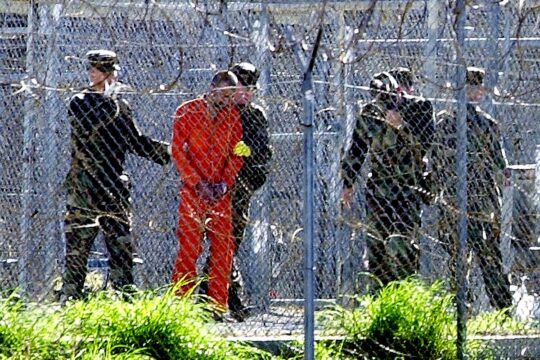Putting a prisoner to death "stays with you for a long time," says Ron McAndrew.
The former warden of Florida State Prison says his own mental health had begun to deteriorate by the time he left his position in 1998 after taking part in eight executions.
Now, McAndrew is fighting against the death penalty.
He is particularly concerned about the psychological well-being of the handful of officials who would be involved if Arkansas were to proceed with the rapid-fire executions of several condemned men, originally set for April 17 to 27. Courts in that southern state have blocked those executions for now, as legal appeals continue.
"We wanted the governor (of Arkansas) to understand that he's sitting in his office very comfortable. And these men are going to be partaking in a killing of another human being," McAndrew told AFP. He doesn't use the word "execution," which he considers a euphemism.
"These officers, they get to know these inmates," he explained.
"Twenty-four hours a day they work with these inmates. They feed them. They take them to get their showers, they take them for exercise. They stand in front of their cells and they talk to them when they feel lonely," McAndrew said.
"The only persons that the inmates know are the officers. Suddenly it's the same officer who's taking them to another room to kill them."
"The experience is something that will stay with you for a long time; I don't think it ever goes away."
- Five-person execution team -
McAndrew, who took part in the deaths of eight convicts -- three in Florida, and five in Texas as training -- says that the executions in Arkansas will undoubtedly be carried out by the same five people.
"You can't change the team," he said. "The officers that will carry out the executions, they have practiced the executions several hundred times. They do it over and over and over again," he said.
An officer volunteers to play the part of an inmate, he said.
"They take him from the cell, they put them on the gurney, they strap him down, they put them on the IVs," or intravenous lines.
Arkansas prison authorities have refused to divulge the makeup of their execution team, fiercely protecting the identities of those involved.
"I can say that they are well-trained and qualified to carry out their respective responsibilities," said Solomon Graves, a spokesman for the Arkansas Department of Correction.
In the view of anti-death penalty activists, everyone involved pays a price.
"We are concerned for the welfare of the prisoners, we are concerned for the victims' families, we are concerned for the welfare of the prison workers that have to do this," said Abraham Bonowitz, director of the New York-based Death Penalty Action group.
"There's a broader range of collateral damage than simply the prisoner and the victim."
- Risk of error -
Arkansas's original packed schedule would place added pressure on the execution team, increasing the risk of error, critics say. And no one wants to see a repeat of the agony Clayton Lockett suffered during his botched execution in Oklahoma in 2014.
"The rapid schedule will put an extraordinary burden on the men and women required by the state to carry out this most solemn act, and it will increase the risk of mistakes in the execution chamber -- which could haunt them for the rest of their lives," said Allen Ault, Georgia's former commissioner of corrections who has overseen five executions, writing in Time magazine's March 28 edition.
A group of former officials from all over the United States, including McAndrew and Ault, have written to Governor Asa Hutchinson of Arkansas urging him not to impose such a burden on prison staff.
"Even under less demanding circumstances, carrying out an execution can take a severe toll on corrections officers' well-being," the letter said.
"We are gravely concerned that by rushing to complete these executions in April, the state of Arkansas is needlessly exacerbating the strain and stress placed on these officers," increasing the chance of error.
Arkansas's original plan to execute eight men in 10 days this month would have set a rate never seen since the United States resumed the death penalty in 1977, the nonprofit Death Penalty Information Center has reported.


